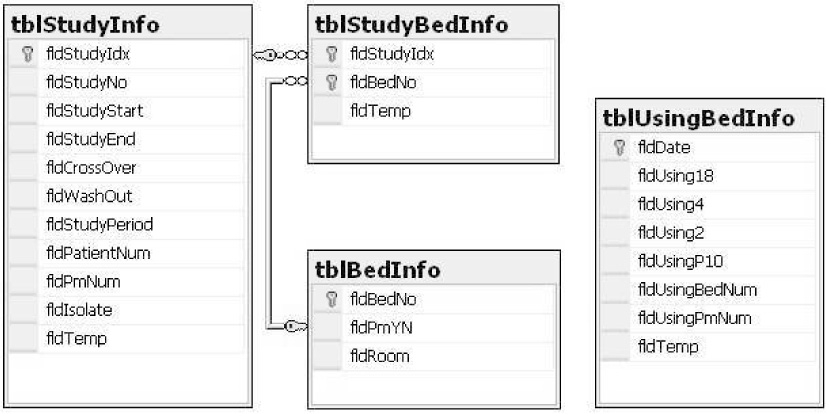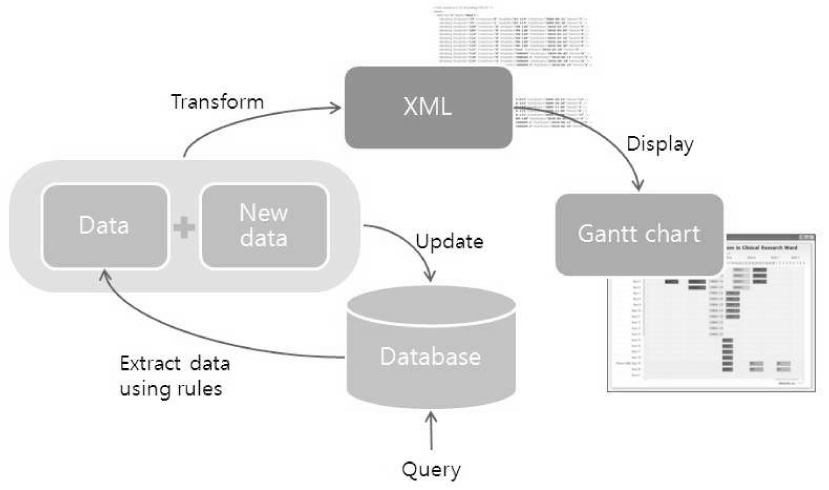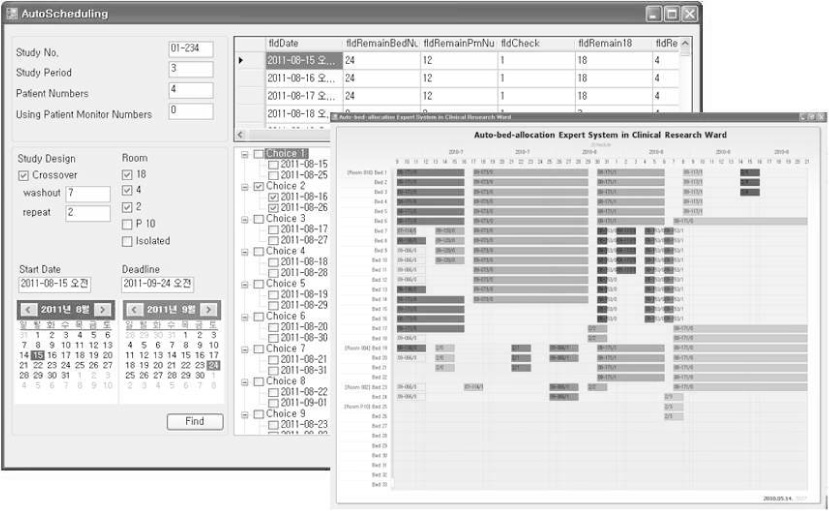J Korean Soc Clin Pharmacol Ther.
2012 Jun;20(1):51-59.
The Development of Automated Bed-allocation Expert System in Clinical Research Ward
- Affiliations
-
- 1Clinical Trial Center, Inje University Busan Paik Hospital, Busan, Korea.
- 2Department of Marine Bio-Materials, Pukyoung National University, Busan, Korea.
- 3Department of Clinical Pharmacology, Inje University Busan Paik Hospital, Busan, Korea. eykim@inje.ac.kr
Abstract
- BACKGROUND
Demands for complicated and long-term administration clinical trials have been increased since investigators actively involved in early stage clinical trials including first-in-human (FIH) trials. Research wards in our clinical trial center were mainly used for phase 1 trials. In order to perform several clinical trials simultaneously during a short period with a minimum number of rooms, beds, and equipment, staffs have to spend a lot of time for efficient operation of limited numbers of facilities. In this study, automated bed-allocation system was developed for efficient scheduling of the research ward based on clinical trial condition and status like experts.
METHODS
The system was developed based on clinical trial design, schedule, and the information on research bed and availability stored and updated in database (DB). Automatic assignment system was designed to find an optimal schedule according to the given information using expert rules and algorithms. The optimal solution can be visualized on Gantt chart using C# and Chart FX API.
RESULTS
The system was developed to demonstrate the schedule on color chart. It turned out to be well-designed to find an optimal schedule for bed allocation. The system also allows automatic updating of the schedule and information in the DB.
CONCLUSION
Automated bed-allocation system developed in this study could save time and improve the efficiency for using space and equipment in clinical trial center. The system can be also applied to similar works or tasks in other fields.
Figure
Reference
-
1. KFDA Press release. last visited on 14 March 2012. http://www.kfda.go.kr/index.kfda?mid=56&seq=17098&cmd=v. [Online].2. Association of Clinical Research Professionals (ACRP). CRC certificate guide. last visited on 14 March 2012. http://www.acrpnet.org/pdf/crc_guide.pdf. [Online].3. Terms Korea. last visited on 14 March 2012. http://www.terms.co.kr. [Online].4. MSDN. last visited on 14 March 2012. http://msdn.microsoft.com/en-us/library/aa286548.aspx. [Online].5. Bose BK. Expert System, Fuzzy Logic, and Neural Network Applications in Power Electronics and Motion Control. Proc IEEE Inst Electr Electron Eng. 1994. 82(8):1303–1323.
Article6. Shortliffe EH. Medical Expert Systems-Knowledge Tools for Physicians. West J Med. 1986. 145(6):830–839.7. Jung JJ, Cho YR, Gu JH, Jo GS. Knowledge-based Ramp Scheduling Expert System. J KIISE Comput Pract Lett. 1997. 3(3):285–294. (Korean).8. Brazile RP, Swigger KM. GATES: An Airline Gate Assignment and Tracking Expert System. IEEE Expert. 1988. 3(2):33–39.
Article9. Metaxiotis KS, Samouilidis JE. Expert systems in medicine: academic illusion or real power? J Inf Technol Theory Appl. 2000. 2(1):19–25.
Article10. Papaconstantinou C, Theocharous G, Mahadevan S. An Expert System for Assigning Patients into Clinical Trials Based on Bayesian Networks. J Med Syst. 1998. 22(3):189–202.11. Ajose S, Ezebuiro II, Adegoke AS. A Rule-Based Approach to Voltage Collapse Estimation: A Case Study of the National Electric Power Authority (NEPA) PLC, Egbin Thermal Station. Pac J Sci Technol. 2005. 6(2):125–131.12. Peters S, Shrobe HE. Using semantic networks for knowledge representation in an intelligent environment. Proceedings of the First IEEE International Conference on Pervasive Computing and Communications (PerCom'03). 2003. 323–329.
Article13. Boegl K, Adlassnig K, Hayashi Y, Rothenfluh TE, Leitich H. Knowledge acquisition in the fuzzy knowledge representation framework of a medical consultation system. Artif Intell Med. 2004. 30(1):1–26.
Article
- Full Text Links
- Actions
-
Cited
- CITED
-
- Close
- Share
- Similar articles
-
- A Comparative Study on the Effects of the Nursing Diagnosis Systems Using Neural Network and Expert System
- Development and Application of a Web-based Expert System using Artificial Intelligence for Management of Mental Health by Korean Emigrants
- Expert recommendations for new heart allocation system in Korea
- Computerization in Ward Nursing Information System Using Order-Communicating System
- A Study on Development of the Automated Critical Pathway for Patients with Cesarean Section






